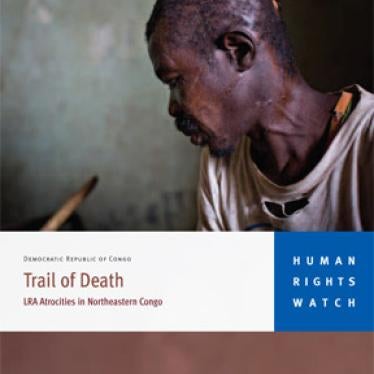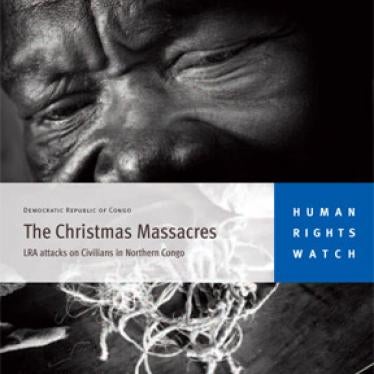(Washington, DC) - President Barack Obama should move swiftly to implement a strategy released on November 24, 2010, to stop atrocities committed by the Lord's Resistance Army (LRA) and help affected communities rebuild, a coalition of seven human rights groups said today. The rebel group has carried out one of the world's longest-running and most brutal insurgencies.
"President Obama's team has done an admirable job in formulating a strategy and demonstrating commitment to address the LRA scourge, but the challenge now is to turn this piece of paper into improvements on the ground," said Paul Ronan, director of advocacy at Resolve. "The president should seek a significant boost in resources in his FY 2012 budget request to address this crisis and then designate a senior State Department official to oversee the strategy's implementation."
LRA violence has plagued central Africa for more than two decades, and is on the increase. During the last two years, the LRA has killed at least 2,300 people and abducted over 3,000 more, including many children. Another 400,000 civilians have fled the violence in the Democratic Republic of Congo (DRC), southern Sudan, and Central African Republic. Over that period of time, the LRA has killed and abducted more civilians than any other armed group in the DRC. In 2010 alone, LRA rebels have committed more than 240 deadly attacks.
"Halting the LRA threat to civilians and catching its leaders who are wanted for war crimes is achievable with political will and the right resources," said Anneke Van Woudenberg, senior Africa researcher at Human Rights Watch. "The LRA has no popular or state support and is only able to replenish its ranks by snatching children from their villages."
The Obama administration strategy outlines four primary goals for US engagement with the crisis, including stopping LRA leaders, protecting civilians from LRA attacks, encouraging escape and defection from the LRA, and providing humanitarian assistance to affected communities. It emphasizes an interagency approach and coordination with multilateral and regional partners, and raises the possibility of designating additional personnel within the administration to carry out the strategy.
The hallmark of LRA attacks is extreme brutality, targeting the most vulnerable villages. Even small-scale attacks have sent waves of terror throughout communities, causing serious suffering and mass displacement and traumatizing people for years to come. President Obama's LRA strategy rightly recognizes the need to increase humanitarian assistance to people affected by the LRA, the groups said.
"The LRA attacks are a huge threat to civilians and to regional peace and stability," said Monica Serrano, executive director of the Global Centre for the Responsibility to Protect. "The international response has been woefully inadequate. The new US strategy is a chance to bring countries together to end the LRA's brutal reign, putting the protection of civilians at the heart of the effort."
The LRA Disarmament and Northern Uganda Recovery Act was the most widely supported, Africa-specific legislation in recent US Congressional history. The law was cosponsored by a bipartisan group of 65 Senators and 201 Representatives, representing 49 states. Tens of thousands of Americans, including many young people, mobilized to support the legislation.
"Thanks to unprecedented grassroots mobilization and bipartisan Congressional leadership, president Obama has a clear mandate to help bring a long overdue end to this crisis. Now there is an urgent need to move quickly on implementing the strategy and ending the LRA's threat to civilians," said David Sullivan, research director, Enough Project.
The following seven organizations have signed on to this press release:
- Enough Project
- Genocide Intervention Network / Save Darfur
- Global Centre for the Responsibility to Protect
- Human Rights Watch
- Invisible Children
- Refugees International
- Resolve
Background on the LRA and US Engagement on the Crisis
The Lord's Resistance Army (LRA) was founded more than two decades ago by Joseph Kony. The LRA was originally based in northern Uganda, where thousands of civilians were killed and nearly two million displaced by the conflict between the rebels and the Ugandan government. The rebel group expanded its operations into southern Sudan in the 1990s, where it received support from the Sudanese government in Khartoum. Though the rebel group ended attacks in northern Uganda in 2006, it moved its bases to the northern Democratic Republic of Congo and has since committed acts of violence against civilians in remote regions of Congo, southern Sudan, and the Central African Republic. Kony and his top commanders sustain their ranks by abducting civilians, including children, to use as soldiers and sexual slaves.
Three of the LRA's leaders - Joseph Kony, Okot Odhiambo, and Dominic Ongwen - are sought by the International Criminal Court (ICC) under arrest warrants issued in July 2005 for war crimes committed in northern Uganda. All three remain at large and have been implicated in new atrocities.
In December 2008, following the collapse of peace negotiations, southern Sudan, Uganda, and Congo began a joint military offensive against the rebel group known as "Operation Lightning Thunder." The military campaign received logistical, financial and intelligence support from the United States. In the subsequent two years the LRA dispersed into multiple smaller groups and continued their brutal attacks on civilians. LRA violence has often targeted churches, schools and markets, and includes the killings of more than 850 Congolese civilians during the 2008 Christmas period and the massacre of at least 345 Congolese civilians in the Makombo area of northern Congo in December 2009.
The LRA Disarmament and Northern Uganda Recovery Act was introduced in Congress by a bipartisan coalition of Senators and Representatives on May 19, 2009. It passed the Senate on March 10, 2010, and the House of Representatives on May 12.
President Obama signed the legislation into law on May 24 and released a statement saying, "I signed this bill today recognizing that we must all renew our commitments and strengthen our capabilities to protect and assist civilians caught in the LRA's wake, to receive those that surrender, and to support efforts to bring the LRA leadership to justice."
Section 4 of the law required the president to develop "a strategy to guide future United States support across the region for viable multilateral efforts to mitigate and eliminate the threat to civilians and regional stability posed by the Lord's Resistance Army" and report that strategy to Congress within 180 days of the legislation being enacted.






